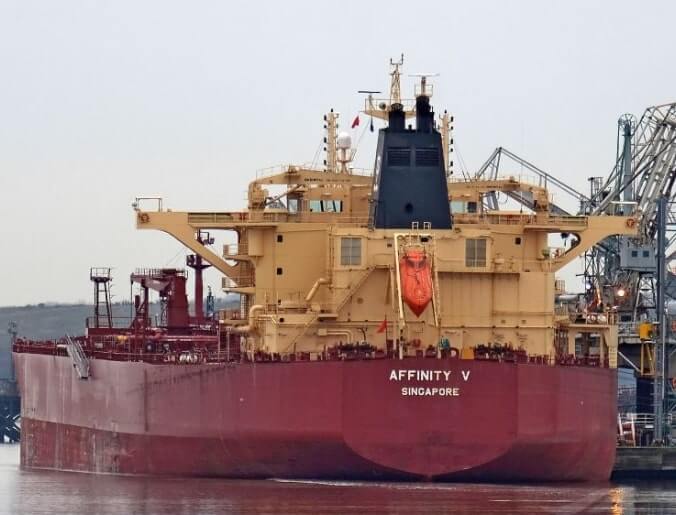Oil Tanker Affinity-V gets Stuck at Suez Canal for Five Hours

September 05, 2022
Singaporean-flagged Affinity V vessel got stuck in shallow water on Wednesday at around 7.15 p.m. local time. The oil tanker blocked traffic in the global waterway for around 5 hours. The Suez Canal Authority’s head Osama Rabie said in a statement that five authority’s tug boats were able to handle the situation in a systematic manner, by which the vessel refloated.
Due to the technical failure of the steering system, the ship got aground. The ship was a part of the convoy, which was heading towards the red sea. Two convoys pass through the Suez canal every day; one approaching the Mediterranean and the other towards the south to the red sea.
The Suez canal is a major link for the transportation of oil, natural gas, and cargo. This waterway divides continental Africa from the Sinai Peninsula. Affinity V vessel was built in 2016 with 252 meters long and 45 meters broad. According to a spokesman, the oil tanker was traveling to the Saudi Arabian Red Sea port of Yanbu, from Portugal.
At around 17:00 UTC today (2022-08-31), the Aframax tanker AFFINITY V (9645401) seemed to have lost control in the Suez Canal while heading southbound. She temporarily clogged up traffic and is now facing south again, but moving slowly by tugboat assistance. via @MarineTraffic pic.twitter.com/ECstNLPtbc
— TankerTrackers.com, Inc. (@TankerTrackers) August 31, 2022
Well, this is not the first time a vessel is blocked in the Suez canal. Earlier in March 2021 also, a colossal container ship Panama-flagged Ever Given smashed onto the banks of the canal, as a result of a sand storm. Ever Given blocked the canal for around six days.
By a fleet of tug boats, the vessel got released. Many supply chains got strained due to traffic jam. Moreover, in September 2021 also a large vessel touched the grounds for a few hours. Canal authorities started working on enlarging the canal’s path after this incident.
The Suez canal is a very important source of foreign currency for Egypt. Approximately around 10% of the world trade passes through the canal.
Also Read: The Ever Given Incident may Cost $2Bn in Claims
Click here to join our Telegram chanel
You will get information, news, and support related to Merchant Navy.
